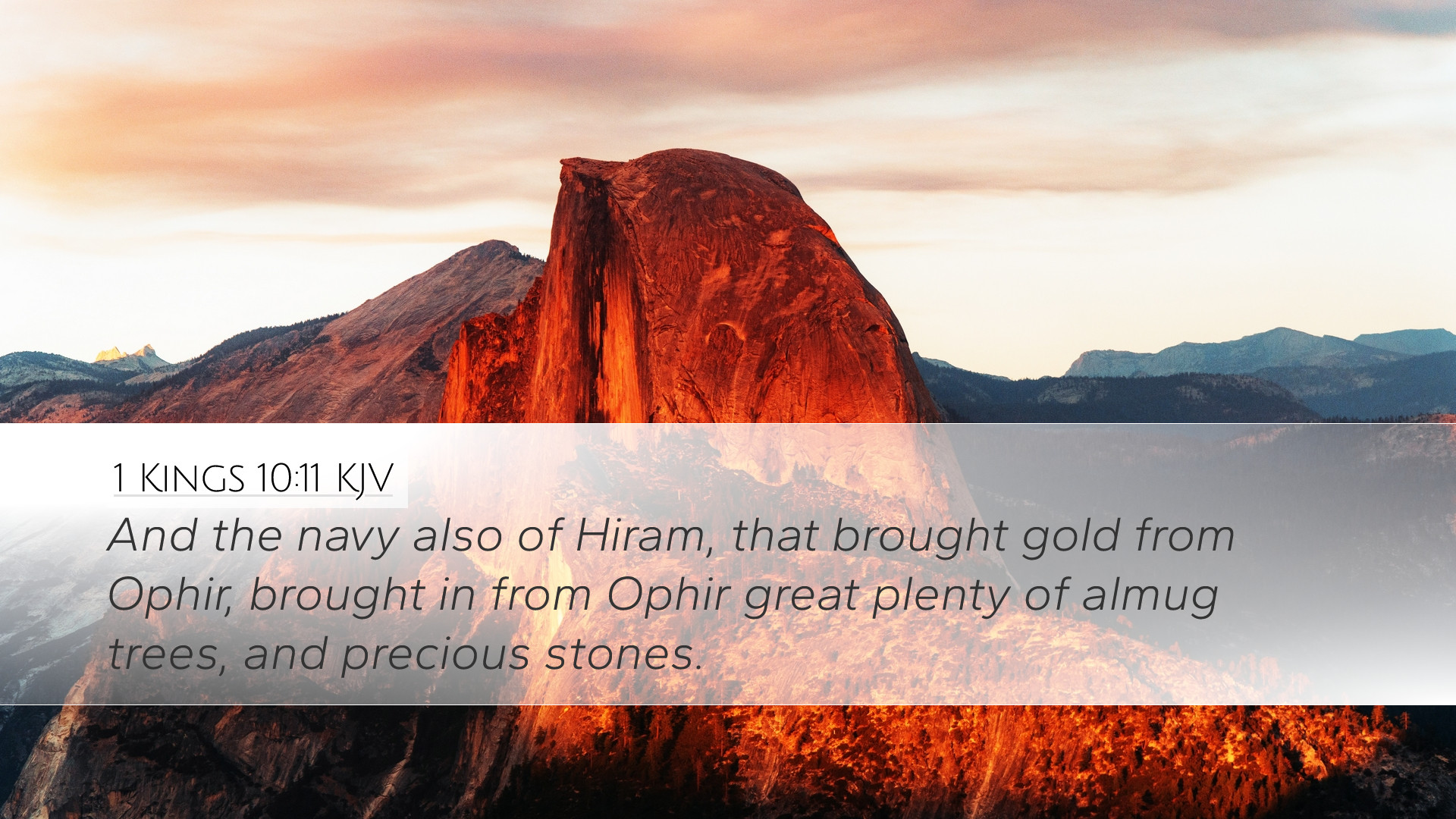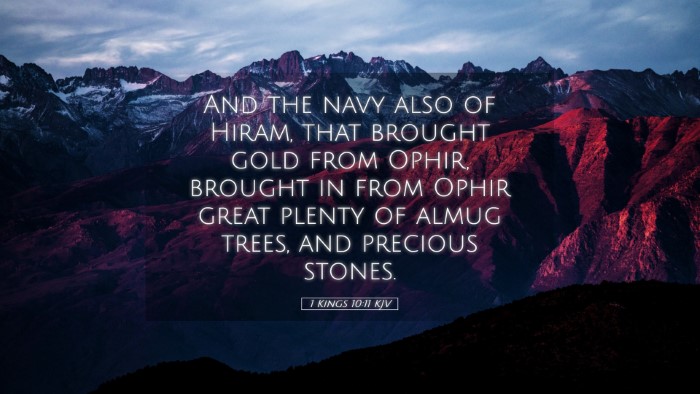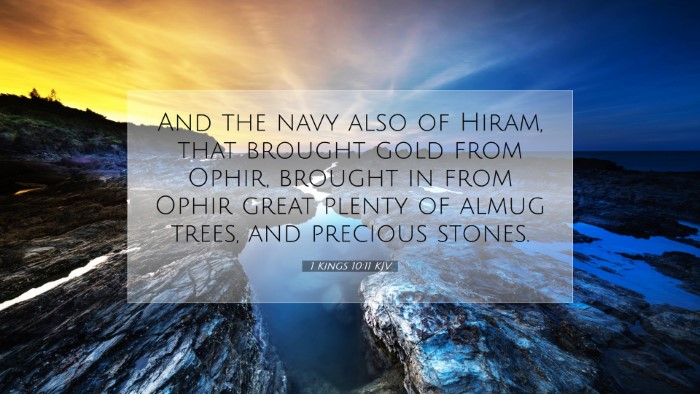Commentary on 1 Kings 10:11
Biblical Context: 1 Kings 10:11 occurs during a pivotal point in the reign of King Solomon. The chapter illustrates the height of Solomon's wisdom and wealth, as well as his renowned international relationships, particularly with the Queen of Sheba. This verse specifically highlights the significance of the presence of the ships of Tarshish, which brought a wealth of resources to Solomon’s kingdom.
Verse:
"And the navy also of Hiram, that brought gold from Ophir, brought in from Ophir great plenty of almug trees, and precious stones."
Insights from Public Domain Commentaries:
Matthew Henry's Commentary
Henry notes that the trading expeditions of Hiram's navy are reflective of the height of Israel's prosperity under Solomon's reign. These maritime ventures were significant not only for their direct economic benefits but also for the enhancement of Solomon’s reputation and power.
- The Importance of Trade: The mention of the navy and its trade routes serves as a reminder of the importance of commerce in establishing a kingdom's strength and alliances. Trade with distant lands like Ophir introduced valuable resources that were critical for the building projects and luxury of Solomon's kingdom.
- The Symbol of Almug Trees: Almug trees, used for various constructions and possibly as a luxury wood, indicate the richness of the resources from distant lands. Solomon’s use of these unique materials illustrates his status and the splendor of his reign.
Albert Barnes' Notes on the Bible
Barnes elaborates on the historical context, emphasizing the expeditions of Hiram's navy and the significant contributions they made. He notes that the trading expeditions were well-organized ventures that provided not only wealth but a variety of materials that played a role in the construction of the temple and other royal buildings.
- Geography of Trade: Ophir’s exact location remains uncertain; however, it was universally known for its riches. This uncertainty adds a layer of intrigue about the extent of Solomon's influence and connections in the ancient world.
- Cultural Exchange: These maritime ventures facilitated cultural exchanges, revealing that Solomon's influence extended beyond mere military power to include trade and diplomacy.
Adam Clarke's Commentary
Clarke offers a detailed examination of the verse, focusing particularly on the types of goods brought back, including the precious stones and unique woods. His commentary highlights the significance of these materials within the cultural and religious contexts of the time.
- Symbolism of the Goods: Clarke notes that the precious stones and almug trees symbolize God’s blessings upon Solomon’s reign. They represent both physical wealth and spiritual significance, as the temple was to be adorned with the finest materials, reflecting God’s glory.
- The Impact on Worship: The accumulation of such wealth for the purpose of worship emphasizes the relationship between economic prosperity and spiritual devotion in Israel. The resources were intended for the enhancement of worship practices, indicating that material wealth was to be used for glorifying God.
Theological Reflections:
This verse serves as a crucial junction for theological reflection on several key themes that resonate throughout Biblical scripture.
- The Sovereignty of God: The success of Solomon is a direct reflection of God’s favor and sovereignty, demonstrating how God can use nations and leaders to fulfill His divine plans.
- Material Wealth and Spiritual Responsibility: The narrative challenges believers to consider how they manage their resources. The abundance and richness should not lead to pride but should compel one toward greater responsibility in worship and service.
- International Relations and God's Plan: Solomon's relationship with foreign nations illustrates the broader theme of God’s redemptive plan encompassing all nations, foreshadowing the eventual call of the Gentiles in the New Testament.
Application for Today:
For pastors, students, theologians, and scholars, 1 Kings 10:11 challenges each to reflect on their own lives and the community of believers:
- Stewardship: How can we ensure that our resources, whether material or intellectual, are stewarded in a way that honors God and serves the church community?
- Wisdom in Relationships: As Solomon engaged wisely with foreign nations, how can we approach our own intercultural relationships to foster peace and understanding while standing firm in our faith?
- Glorifying God through Resources: Are we using the blessings that God has given us to promote worship and glorify His name, or are we hoarding them for selfish gain?
Conclusion:
1 Kings 10:11 captures a moment of rich historical significance that resonates with enduring theological truths. The insights provided by Henry, Barnes, and Clarke offer a multifaceted understanding of how God blessed Solomon’s reign with prosperity, which was meant to glorify God and serve the people. As believers navigate their complex world, the lessons from Solomon’s reign remind us to seek wisdom, embrace stewardship, and recognize that all resources ultimately belong to God.


